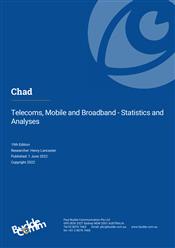Chad Telecoms Market Report
Telecoms, Mobile and Broadband - Statistics and Analyses

Publication Date: April 2024
Report Pages: 126
Lead Analyst: Henry Lancaster
Contributing Analyst: Peter Lange
Chad continues to improve international internet connectivity
During the last decade Chad’s economy has been dominated by oil exports, and as a result economic growth has been affected by the changing prices for the commodity on international markets. Recent economic difficulties have been exacerbated by civil unrest, an influx of refugees from neighbouring countries, and the economic downsides resulting from the pandemic.
The country remains one of the least developed on the continent, while telecom infrastructure is particularly poor, with penetration rates in all sectors – fixed, mobile and internet – well below African averages. Nevertheless, despite difficult operating conditions, large scale poverty and low spending power, Chad’s telecom market offers some potential for investors to develop services given the low starting base.
The two main operators Moov Africa Chad and Airtel Chad have invested in infrastructure and have become the main providers of voice and data services. However, the difficult economic conditions of the country, compounded by taxes on telecom services which have adversely affected customer spend and operator revenue, encouraged these players to consider exiting the market.
The mobile sector has developed steadily under the auspices of these two operators. The national telco and fixed-line operator Sotel Tchad operates the country’s third mobile network, as Salam Mobile, though it is mainly focussed on voice services since it depends on GPRS and EDGE technologies (which can provide only basic mobile data services). The country’s first 3G/LTE mobile licence was awarded in April 2014.
Chad finally gained access to international fibre bandwidth in 2012. Its national backbone infrastructure remains underdeveloped. The World Bank-funded Central African Backbone (CAB) project takes in Chad, while the country is also party to a Trans-Saharan Backbone project which will link a fibre cable to Nigeria and Algeria.
Key developments:
- International mobile roaming charges eliminated among Central African Economic and Monetary Community countries;
- Camtel, SudaChad Telecom, and Sudatel announce plans to build a terrestrial fibre cable connecting through Cameroon, Chad, and Sudan;
- Government removes duty on imported telecom devices to boost adoption of digital services;
- Airtel Chad drops plan to sell passive infrastructure in Chad to Helios;
- Moov Chad increases the number of mobile base stations, preps for FttP rollout;
- Government approves three-part telecom infrastructure upgrade project as part of the Strategic Plan for Digital Development and Posts 2020-2030;
- 2021 Finance Law reduces spectrum fees;
- N'Djamena - Adré axis fibre link is opened;
- Report update includes the regulator’s market updates to 2020, operator data to Q1 2022, updated Telecom Maturity Index charts and analyses, recent market developments.
Companies mentioned in this report:
Sotel Tchad, TchadNet, Airtel Chad, Tigo Chad, Tchad Mobile (Orascom), Maroc Telecom, Sitcom, Salam Mobile
Related Reports
- Africa - Mobile Infrastructure and Mobile Broadband
- Africa - Mobile Network Operators and MVNOs
- Africa - Fixed Broadband Market - Statistics and Analyses
- Mozambique - Telecoms, Mobile and Broadband - Statistics and Analyses
- Libya - Telecoms, Mobile and Broadband - Statistics and Analyses
- Cameroon - Telecoms, Mobile and Broadband - Statistics and Analyses
- Eritrea - Telecoms, Mobile and Broadband - Statistics and Analyses
- Lesotho - Telecoms, Mobile and Broadband - Statistics and Analyses
- Benin - Telecoms, Mobile and Broadband - Statistics and Analyses
- Burkina Faso - Telecoms, Mobile and Broadband - Statistics and Analyses
Share this Report
TMT Intelligence
A platform to scale your intelligence tasks
Monitor critical insights with our AI-powered Market Intelligence Platform gathering and analyzing intelligence in real time. With AI trained to spot emerging trends and detect new strategic opportunities, our clients use TMT Intelligence to accelerate their growth.
If you want to know more about it, please see:
Research Methodology
BuddeComm's strategic business reports contain a combination of both primary and secondary research statistics, analyses written by our senior analysts supported by a network of experts, industry contacts and researchers from around the world as well as our own scenario forecasts.
For more details, please see:
More than 4,000 customers from 140 countries utilise BuddeComm Research
Are you interested in BuddeComm's Custom Research Service?
Hot Topics
News & Views
Have the latest telecommunications industry news delivered to your inbox by subscribing to BuddeComm's weekly newsletter.